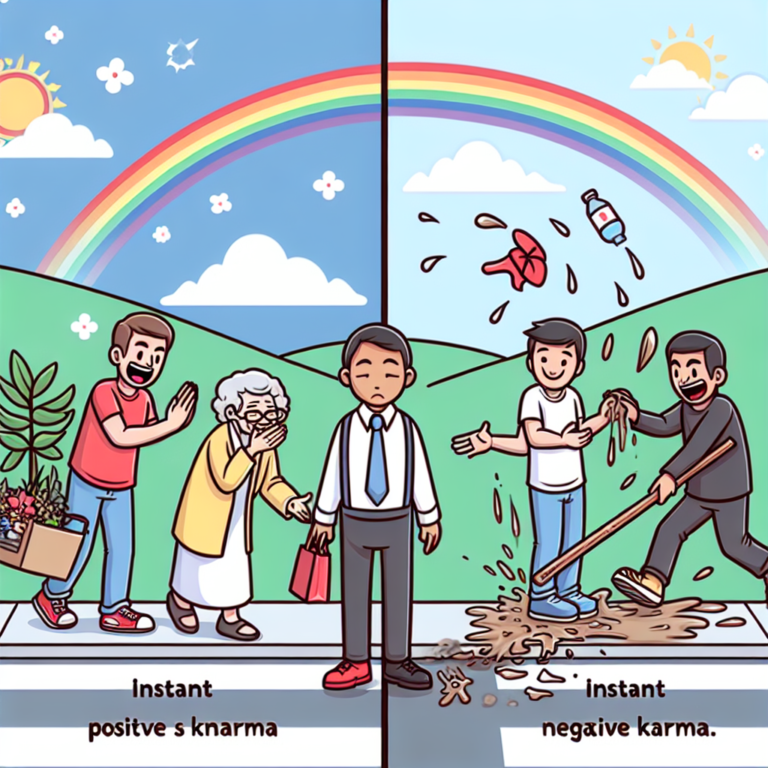In a world where challenges and negativity often dominate headlines and social media feeds, it’s easy to feel disheartened. Yet, every day offers us the opportunity to foster goodness and create a positive impact. This impact, however small, can propagate outward, resembling ripples forming in a pond when a stone is tossed into the water. The concept of the ripple effect serves as a powerful reminder that our positive actions have the potential to create waves of good karma—an idea deeply rooted in philosophy, psychology, and spirituality.
Understanding the Ripple Effect
The ripple effect is the principle that an action—especially a positive one—can have far-reaching consequences beyond the immediate context. When someone acts kindly toward another, it doesn’t just help that person; it can inspire them to pay it forward or encourage onlookers to embrace a similar attitude. This interconnectedness of human behavior is evident in numerous facets of life, including our communities, workplaces, and even online interactions.
For example, a study conducted by social scientists indicates that kindness can spread through social networks, causing individuals who witness or hear about acts of kindness to engage in their acts of generosity. Thus, when we engage in simple acts of kindness, we set off a chain reaction that can lead to a vastly better and more compassionate world.
Positive Actions and Good Karma
Karma, a term often associated with Eastern religions like Buddhism and Hinduism, refers to the concept that our actions have consequences—good actions lead to good outcomes, while negative actions lead to negative consequences. In essence, the energy we put into the world returns to us in some form or another. The more positive energy we generate, the more likely we are to experience positive outcomes.
Simple Acts that Create Ripples
Acts of Kindness: Simple gestures like holding the door open for someone or offering a genuine compliment can brighten someone’s day. These small actions can inspire the recipient to extend kindness to others, effectively widening the circle of positivity.
Volunteering: Engaging in community service, whether through mentoring, environmental clean-up, or supporting local charities, not only benefits the community but can encourage others to volunteer as well. The shared goal of bettering society fosters a sense of cooperation and goodwill.
Positive Communication: Encouraging dialogue and expressing gratitude in our personal and professional interactions can lead to healthier relationships. A culture of open communication creates an environment where people feel valued, fostering greater collaboration.
- Sustainable Living: Making conscious choices regarding consumption—such as reducing plastic use and supporting ethical brands—demonstrates responsibility toward the environment. When others see your commitment to sustainability, they may feel compelled to follow suit, leading to a collective reduction in environmental impact.
The Psychological Underpinnings
Psychologists assert that kindness and altruism are intrinsic human qualities that enhance overall well-being. Engaging in positive behaviors activates brain regions associated with rewards, reinforcing the idea of promoting goodwill. When we perform acts of kindness, our brains release oxytocin, often referred to as the "love hormone," which can positively transform how we feel about ourselves and others.
Moreover, engaging in positive actions can lead to an increase in happiness and life satisfaction. As happiness spreads through the ripple effect, we create a more supportive environment for everyone involved, contributing to an overall higher quality of life.
The Network of Good Karma
The ripple effect doesn’t stop with individual interactions; it expands into broader societal networks. For instance, a movement can arise from a single act of generosity or compassion. Think of viral campaigns advocating for social justice, environmental protection, and mental health awareness. These movements often begin with a few dedicated individuals whose actions inspire many others, spreading their message globally and prompting significant change.
Embracing the Ripple Effect in Daily Life
To harness the potential of the ripple effect in your everyday life, consider implementing some of the following practices:
Be Intentional: Start each day with the aim of spreading positivity. Whether you choose to show gratitude, lend help, or simply offer a smile, set an intention to create good karma.
Inspire Others: Share your experiences of kindness and generosity, whether through social media or in conversations with friends. By showcasing positive actions, you can motivate others to partake in similar behaviors.
Reflect and Learn: Take time to reflect on the outcomes of your actions. Understanding the consequences of your behaviors can inspire further positive changes and enhance your awareness of the ripple effect in your life.
- Cultivate a Community of Kindness: Surround yourself with individuals who share your values of kindness and compassion. Engage in group activities, community projects, or support groups that focus on building each other up.
Conclusion
The ripple effect illustrates our capacity to positively influence the world around us. By consistently engaging in small acts of kindness and spreading positivity, we not only improve our own well-being but contribute to a more compassionate and interconnected society. Good karma is not just a philosophical concept; it is a tangible reality that illustrates how our actions—however small—create waves of change. You never know how far your kindness will travel, so embrace the ripple effect and make the world a better place, one positive action at a time.
FAQs
1. What is the ripple effect?
The ripple effect refers to the phenomenon whereby an individual’s actions, particularly positive ones, create far-reaching effects that influence those around them, leading to a cycle of kindness and encouragement.
2. How does karma relate to the ripple effect?
Karma is the concept that our actions have consequences. Engaging in positive actions generates good karma, meaning that the positive energy we put forth can return to us in beneficial ways, often through our connections with others.
3. Can small acts of kindness really make a difference?
Absolutely! Small acts of kindness can inspire others and ignite a chain reaction of positive actions within communities, ultimately resulting in significant impacts.
4. How can I start creating a ripple effect in my life?
You can start by being intentional with your actions. Aim to perform daily acts of kindness, engage in community service, express gratitude, and promote a positive environment in your interactions.
5. Is the ripple effect limited to in-person interactions?
No, the ripple effect can manifest in digital interactions as well! Kindness shared online through social media can inspire many others across the globe, reinforcing the idea that positive actions extend beyond physical boundaries.
It seems like your message is incomplete. Could you please provide more context or specify what kind of prompt you are looking for? Whether it’s a writing prompt, a question, or something else, I’m here to help!, #Ripple #Effect #Positive #Actions #Create #Waves #Good #Karma, #Ripple #Effect #Positive #Actions #Create #Waves #Good #Karma, 1736704971, the-ripple-effect-how-your-positive-actions-create-waves-of-good-karma





